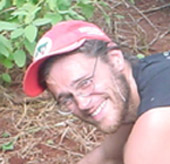Last week marked the fourth anniversary of the murder of Brad Will, a 36-year-old American activist and journalist who was shot while covering anti-government protests in the southern Mexican state of Oaxaca. His murderers remain at large.
The day he died, October 27, 2006, Will had rushed to the scene of a street battle on the outskirts of the capital city of Oaxaca. The clash pitted protesters against a group of armed pro-government men, allegedly linked to the embattled Oaxaca governor, Ulises Ruiz, whom the protesters aimed to oust. The street clash drew a number of local reporters and photographers, who reported alongside the protesters. Will joined in, representing Indymedia, an online news agency based in New York, where he lived before heading to cover the Oaxaca uprising.
The street battle turned deadly as the armed men fired at the protesters. Two bullets hit Will. He died almost immediately. Throughout the showdown, and right up until he was shot, Will kept his camera rolling. Journalists at the scene also photographed the clash. After the murder, the consensus was strong among several journalists at the scene, along with other eyewitnesses, that the men shooting into the crowd in Will’s direction were responsible for the crime. Two of those armed men, both government officials, were detained briefly following Will’s death, yet Oaxacan officials released them after concluding that the bullets recovered from Will’s body during the autopsy did not match the guns carried by the men the day of the shooting.
As the investigation continued, the authorities began to suspect that the protesters surrounding Will were responsible for the murder. State officials also concluded that at least one of the shots came from a point-blank range. Immediately, human rights groups, local journalists–and Will’s family–began denouncing the murder investigation as botched and an attempt by the state government to avoid implicating any of its own officials in the murder. Further, such pro-government groups were also linked to the murders of at least 17 other individuals during the 2006 conflict.
Critics of the investigation pointed to reports conducted by independent teams, including the Boston-based nonprofit Physicians for Human Rights and Mexico’s own National Human Rights Commission, that supported the theory that the bullets came from a longer range and matched the distance from which the pro-government armed men fired. The government’s investigation also contradicted conclusions in the Oaxaca state autopsy report, which found the wounds to Will’s body consistent with long-range shots.
Despite the evidence, in October 2008, local authorities arrested Juan Manuel Martínez, a Mexican man who lived near the scene of the shooting and worked as a baker. At the time of Will’s death, Manuel Martínez, who had supported the anti-government protest movement, was in the neighborhood near the battle, but no witness placed him at the scene. Officials also did not produce a weapon or motive linking Martínez to the murder. After his arrest, Liliana Tejada, Martínez’s wife, told the CPJ that she was convinced that her husband was a scapegoat. Outspoken about her husband’s innocence, Tejada and her young children received anonymous phone threats and were followed on several occasions by men in unmarked cars.
In February, after 16 months in prison, Manuel Martínez was freed after a federal appeals tribunal cleared him of the murder. After his release, Martínez told the CPJ that it was “easier to implicate somebody like me than the real killers.”
Today, Will’s murder case remains open and unsolved. Will’s mother, Kathy Will, told me that she and her family remain in touch with human rights groups and U.S. government officials who keep watch over the case, “but there has been no movement in the case, no communication from Mexican officials with us about it at all.” The family’s lawyer, Miguel Ángel de los Santos, told CPJ that neither state nor federal authorities have announced any fresh leads or suspects in the investigation.
On December 1, political change, at least formally, will take place in Oaxaca. Gov. Ulises Ruiz will be replaced by Gabino Cué of the left-leaning Party of the Democratic Revolution. Ruiz belongs to the old-guard Institutional Revolutionary Party, or PRI, which ruled Mexico for 71 years until Vicente Fox won the presidency in 2000. Yet in Oaxaca the PRI has maintained its power unbroken. It remains unclear whether the political shift will trigger a renewed attempt to investigate the Will murder or the other murders committed during the 2006 Oaxaca conflict.
